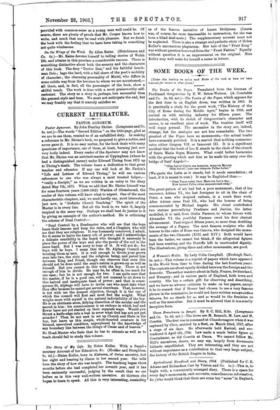CURRENT LITERATURE.
PASTOR AGNORUM.
Pastor Agnorum. By John Huntley Skrine. (Longmans and Co. 5s. net.)—The words "Second Edition" on the title-page, glad as we are to see them, remind us of an unfulfilled duty. In making a reference to Mr. Skrine's book, we proposed to give a notice, and never gave it. It is no easy matter, for the book deals with many questions of importance, one of them, at least, burning just now very hotly indeed. Every reader of the Spectator may not know that Mr. Skrine was an assistant-master at Uppingham (where he had a distinguished career) under Edward Thring from 1873 up to Thring's death. The volume bears a dedication to that great teacher and educator. If any one will look at Mr. Parkin's "Life and Letters of Edward Thring," he will see various references to one who was always a most trusted helper,— "really a disciple," as we see written in an entry in the diary dated May 7th, 1875. When we add that Mr. Skrine himself was for some fourteen years (1888-1902) Warden of Glenalmond, the reader of this volume will know what to expect. One of the most
characteristic chapters, and, we need hardly say, most interesting just now, is "Definite Church Teaching." The spirit of the Master is in every line. But all the book is, we take it, largely inspired in the same way. Perhaps we shall best do justice to it by giving an example of the author's method. He is criticising the scheme of Dual Control :—
• " Dual Control by a Headmaster who will see that the boys learn their lessons and keep the rules, and a Chaplain who will see that they are religious. It was humanely conceived, I admit, for it seems to halve the heavy orb of power; and I acknowledge a delicate sensibility in the board who thought it unseemly to place the power of the keys and also the power of the rod in the same hand. But I was sorry to hear of it. It will not do : for boys will be boys. I mean that the St. Alphege Council are treating them as men. It is well enough to divide your grown man into two, the civic and the religious being, and parcel him between King and Priest, though one observes that even this should not be done until the man's nation is grown-up as well as himself. But you cannot do this with the boy. There is not enough of him to divide. He may be, he often is, too much for one man ; but he is not enough for two. I am quite sure that the master, if he is a good one, will not consent to sit down to this halved and inadequate feast of power ; and that in conse- quence St. Alphege will have to invite one who must take what they offer because he cannot get served elsewhere. That, however, is not with me the deepest objection, though it is the one of which the council will first and most feel the weight. What weighs more with myself is the natural indivisibility of the boy. He is an obstinate atom, defying dissection of the secular and the sacred in him: his consciousness is an embryo in which leaf and flower have not yet started on their separate ways. Would you thrust a knife-edge into a bud to sever what God has not yet put asunder ? Then do not seek to set up Church and State in the boy, but leave us this simple, whole-hearted creature in his blessed, unevolved condition, unperplexed by the knowledge of any boundary line between the things of Caxsar and of heaven."
No Head-Master who feels that he has to educate as well as to teach should fail to study this volume.


















































 Previous page
Previous page